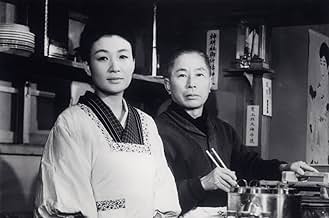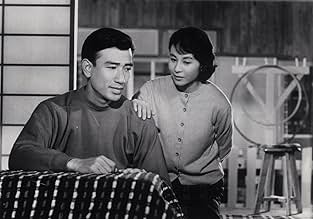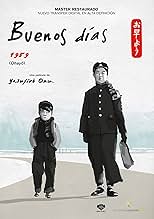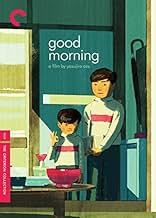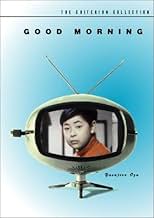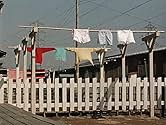VALUTAZIONE IMDb
7,8/10
11.890
LA TUA VALUTAZIONE
Due ragazzi iniziano uno sciopero del silenzio per spingere i genitori a comprare loro un televisore.Due ragazzi iniziano uno sciopero del silenzio per spingere i genitori a comprare loro un televisore.Due ragazzi iniziano uno sciopero del silenzio per spingere i genitori a comprare loro un televisore.
- Regia
- Sceneggiatura
- Star
Recensioni in evidenza
It may have the skimpiest of plots--two young brothers take a vow of silence until their parents buy them a television--but Yasujiro Ozu's 1959 picture is anything but slight, taking on the subject of language (ironic, considering the story) with attentiveness and intelligence. In his deliberate, contemplative manner, Ozu presents a wry commentary on the ways even the most innocuous words can harm (gossip) or become the building blocks of a relationship (a budding romance is confirmed by a conversation about the weather); he also notes Japan's growing fascination with the English language (the older boy studies it) and the increasing obsession, now with fourteen years of distance from the war, with American technology--the suburban landscape is peppered with aerial antennas as television begins to permeate the culture. It's subtly beautiful: each shot is perfectly framed (the camera never moves) with an excellent use of depth that highlights exactly what the director wants you to see and giving you plenty of space to focus; it's easy to see how a master of today's Asian cinema such as Wong Kar-Wai would be profoundly influenced by Ozu's languid yet carefully observed filmmaking. A delight; it's also a fine introduction for younger viewers to the magnificence of international cinema.
Although I appreciate Ozu's film style & quality, I've never been a big fan due to the generally melodramatic themes of his movies.
OHAYO is quite different. The multiple comic themes range from fart jokes & clueless gossiping neighbors to fears of obsolescence in a rapidly changing society.
Particularly prescient is the early awareness of the Baka (idiot) power of television. In Japan it has been common for decades to have TV sets mounted in temples & shrines so that the Kami (spirits) can watch.
We in the U.S. have long been "a nation of 100 million idiots" (and then some) from our obsession with constant entertainment especially in the form of TV. Our children whine & act petulant unless they have their own TV & DVDs in their rooms & even when riding in the car. In many homes the TV is constantly on, regardless of what might be happening either on the boob-tube or outside (such as visitors calling).
Ozu saw it coming almost half a century ago.
OHAYO is quite different. The multiple comic themes range from fart jokes & clueless gossiping neighbors to fears of obsolescence in a rapidly changing society.
Particularly prescient is the early awareness of the Baka (idiot) power of television. In Japan it has been common for decades to have TV sets mounted in temples & shrines so that the Kami (spirits) can watch.
We in the U.S. have long been "a nation of 100 million idiots" (and then some) from our obsession with constant entertainment especially in the form of TV. Our children whine & act petulant unless they have their own TV & DVDs in their rooms & even when riding in the car. In many homes the TV is constantly on, regardless of what might be happening either on the boob-tube or outside (such as visitors calling).
Ozu saw it coming almost half a century ago.
Ozu said he wanted to make a film about people's inability to express the important things, but natter on about unimportant gossip. This all comes out thanks to two boys that really want a TV. They enter into a vow of silence until their TV comes. This silence is misconstrued by the neighbours, who think their mother is angry at them. They begin to gossip amongst themselves and rumors soon start. Meanwhile, the young boys' aunt and teacher are attracted, but fail to act on their emotions. This is a lovely little film, filled with some great humor. Though, I must admit, there was a bit too much focus on the poo/farts jokes. The two boys, especially the youngest, are very cute and make their efforts to get a TV seem less brattish. It's really sweet to see how dedicated the parents are, and even though the kids are kind of mean, they do appreciate the gift in the end. There's no escaping Ozu's look at the clashes between old and new, with the TV looming over all procedures as something that will change life. A little gem, if not one of Ozu's classics.
For viewers who have seen only one or two of Ozu's statelier films -- say, "Tokyo Story" or "Equinox Flower" -- "Good Morning" will be a surprise. Two children take a vow of silence to coerce their parents into buying a television set: that's pretty much the whole plot. But what happens as a result affects almost every aspect of life in the nondescript, gossipy, elbow-to-elbow suburb in which the boys' family lives.
This is a comedy, and like all good comedies it's very serious. The boys' act of rebellion is very un-Japanese, and it threatens many of the politely ritualistic social behaviors that mask and deflect the tensions in Japanese society. Whole alliances among the village's women teeter and threaten to topple. The family's authority structure is upended, with the all-powerful father crumbling against the stubborn silence of two little boys.
What wins in the end is love -- or rather (Ozu must have found this particularly funny) love and television. The resolution will probably tear you up (it has brought moisture to the eyes of everyone I've seen it with) but it represents enormous changes in Japanese society -- the collapse of patriarchal authority, the invasion of foreign culture, and especially English-language culture, and the inexorable rise of that great leveler of aesthetics, television. Ozu saw the future, and he wasn't in it.
So naturally, he presents all this in a gentle, even sweet-natured comedy. There may be greater Ozu films, but it's hard to think of one I actually like more than "Good Morning."
This is a comedy, and like all good comedies it's very serious. The boys' act of rebellion is very un-Japanese, and it threatens many of the politely ritualistic social behaviors that mask and deflect the tensions in Japanese society. Whole alliances among the village's women teeter and threaten to topple. The family's authority structure is upended, with the all-powerful father crumbling against the stubborn silence of two little boys.
What wins in the end is love -- or rather (Ozu must have found this particularly funny) love and television. The resolution will probably tear you up (it has brought moisture to the eyes of everyone I've seen it with) but it represents enormous changes in Japanese society -- the collapse of patriarchal authority, the invasion of foreign culture, and especially English-language culture, and the inexorable rise of that great leveler of aesthetics, television. Ozu saw the future, and he wasn't in it.
So naturally, he presents all this in a gentle, even sweet-natured comedy. There may be greater Ozu films, but it's hard to think of one I actually like more than "Good Morning."
While somewhat lighter than most of Ozu's features, this is still a rather perceptive film that is also entertaining to watch. The situation and the characters are all straightforward, yet Ozu's expert eye sees plenty of things worth considering, and each simple story development has a purpose. If the material remains generally lightweight when compared to some of his other movies, it still has the same thoughtful, low-key touch and genuinely human characters.
The young boys drive much of the story in this one, and they are very believable, whether in their petulant responses to parental authority or in their schoolboy fads. Some of the latter can be slightly off-putting at times, but then such things do rather ring true with the nature of boys at that stage of their lives.
The cast is quite large, so that none of the characters gets a lot more screen time than any of the others, yet somehow all of them not only come alive, but get some defining moments. Most of the adult characters are simple, yet easy to care about, and there are several good performances. The grandmother character and the aunt of the two brothers are probably the most interesting of the characters, yet all of them have a purpose.
As is usually the case with Ozu's movies, you can watch it a second time and see additional detail in the characters' relationships and dialogue. This time, the issues involved are not as significant as usual, yet the simple plot provides some insights into the ways that families and neighbors communicate with one another and understand one another. It's probably more entertaining than enlightening, but yet there is some substance as well.
The young boys drive much of the story in this one, and they are very believable, whether in their petulant responses to parental authority or in their schoolboy fads. Some of the latter can be slightly off-putting at times, but then such things do rather ring true with the nature of boys at that stage of their lives.
The cast is quite large, so that none of the characters gets a lot more screen time than any of the others, yet somehow all of them not only come alive, but get some defining moments. Most of the adult characters are simple, yet easy to care about, and there are several good performances. The grandmother character and the aunt of the two brothers are probably the most interesting of the characters, yet all of them have a purpose.
As is usually the case with Ozu's movies, you can watch it a second time and see additional detail in the characters' relationships and dialogue. This time, the issues involved are not as significant as usual, yet the simple plot provides some insights into the ways that families and neighbors communicate with one another and understand one another. It's probably more entertaining than enlightening, but yet there is some substance as well.
Lo sapevi?
- QuizYasujirô Ozu: [movie posters] Yasujirô Ozu pays tribute to his cinematic influences by putting all kinds of film posters all over the wall in his films. In this movie, there are two posters, one of La parete di fango (1958) (at 08:30) and one of Gli amanti (1958) (at 08:07), both at the neighbors' house.
- Versioni alternativeThe original American theatrical release prints were in black and white.
- ConnessioniFeatured in Transcendental Style and Flatulence (2017)
I più visti
Accedi per valutare e creare un elenco di titoli salvati per ottenere consigli personalizzati
- How long is Good Morning?Powered by Alexa
Dettagli
Contribuisci a questa pagina
Suggerisci una modifica o aggiungi i contenuti mancanti



